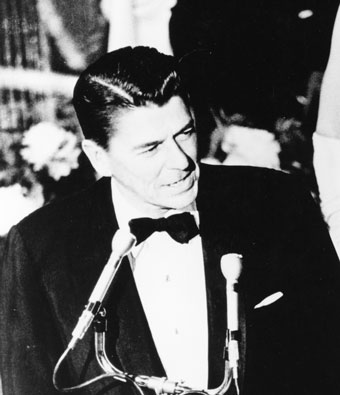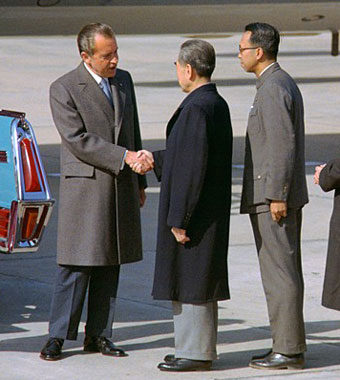Reagan, Nixon, and race
In October 1971, the future president employed a hateful racial trope
Richard Nixon's racism and bigotry are well-established, largely due to the approximately 3,432 hours of secret recordings he made during his presidency. The Miller Center began its Presidential Recordings Program in 1998 to make accessible these and other once-secret White House tapes, which continue to offer insights about not only Nixon but also the many individuals of the era who are featured in the recordings—including Ronald Reagan, then governor of California.

In July 2019, thanks to the efforts of Timothy J. Naftali—former chair of the Miller Center's Presidential Recordings Program and former director of the Richard Nixon Presidential Library and Museum—the National Archives and Records Administration restored previously excised portions of one Nixon tape, including a six-second segment, formerly withheld as “private,” that included racist comments by Reagan.
As Naftali wrote in the Atlantic, the conversation took place on October 26, 1971, roughly eight months after the taping system was installed. Reagan, a popular and rising leader of the conservative wing of the Republican Party, had just returned from a 14-day visit to Asia and the Pacific as a special representative of the president. Reagan’s stops included South Vietnam and Taiwan (the Republic of China, or Nationalist China). Reagan was tired—and furious at the news that the United Nations General Assembly had just voted to expel Taiwan and seat instead the Communist People’s Republic of China (PRC).

For his part, Nixon could not dismiss Reagan’s ideas outright. He needed to secure his conservative base for coming congressional votes and particularly for the presidential campaign of 1972. (Just prior to leaving for Asia, Reagan had pledged his support for Nixon’s reelection, but his degree of enthusiasm could not be taken for granted by the president.) At the same time, Nixon did not want to jeopardize the emerging diplomatic opening to the PRC, which involved finessing the issue of the sovereignty of Taiwan without alienating regional U.S. allies like South Korea and South Vietnam.
Reagan suggests Nixon announce that the United States would no longer participate or be bound by United Nations votes.
That the United States would not vote, and would not be bound by the votes of the U.N., because it is a debating society . . .
Ronald Reagan
Reagan then turns to a racist trope to express his frustration with how African nations voted. Nixon laughs.
. . . to see those—those monkeys from those African countries [President Nixon laughs], damn them, they’re still uncomfortable wearing shoes!
Ronald Reagan
Here is a portion of the phone call. The racist comment appears at 6:30 in this recording:
LISTEN TO THE ENTIRE CALL AND READ THE TRANSCRIPT AT THE PRESIDENTIAL RECORDINGS DIGITAL EDITION FROM ROTUNDA
Just over two hours later, Nixon discusses the matter with his secretary of state, William P. Rogers, to consider how to minimize the damage to the administration without jeopardizing efforts to improve relations with Communist China. Calling Reagan's proposal “ridiculous” and adding “that, in effect, Bill, [it] is like getting out of the U.N.,” he asks Rogers to speak with Reagan in an effort to placate him.
Early in the call, he repeats and even amplifies the California Governor's racism.
I found that what outraged him, and I think this is—I find this is typical of a lot of people—they saw it on television, and he said, ‘These cannibals jumping up and down.’
Richard Nixon
Here is a portion of the phone call. Nixon's description of Reagan's views begins at :27 in this recording:
LISTEN TO THE ENTIRE CALL AND READ THE TRANSCRIPT AT THE PRESIDENTIAL RECORDINGS DIGITAL EDITION FROM ROTUNDA
A close listen to the call reveals more than just overt racism on the part of both men, however, and reflects a larger world view about what kinds of people are worthy of American attention.
Although Nixon expresses sympathy with Reagan's views about the U.N., he directly contradicts the latter's view of the institution as a "debating society" when he refers to tensions between India and Pakistan. "The U.N. may have to play some damn role there," he says, trying to convince Reagan of the U.N.'s value, because "we don't want to get involved in that miserable place."
We don't want to get involved in that miserable place.
Richard Nixon
The end of this portion of the conversation is also revealing. The two leaders agree on the "moral bankruptcy" of allowing the People's Republic of China to replace Taiwan by a simple majority vote. Nixon reaches for a hypothetical example of another outrageous act. It would be like, he says, throwing out other nations, such as Portugal and South Africa. Although the latter was seen as a bulwark against Communism, its policy of apartheid appears not to factor into the moral calculation.
When Reagan did eventually become president, the issue of South African apartheid rose to the front of American consciousness. Instead of confronting the regime, Reagan chose to emphasize engagement, trade, and a history of "friendly" relations. It became one of the few times Republicans broke with the president, as Congress overrode his veto of the Comprehensive Anti-Apartheid Act in 1986. "I think he is wrong," said Senator Mitch McConnell, "We have waited long enough for him to come on board."
